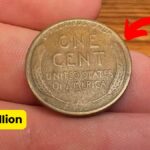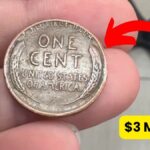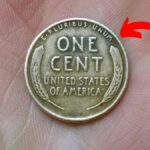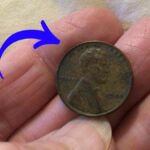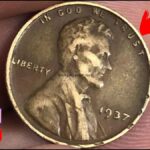The Lincoln Wheat Penny Valued At $550K: In the fascinating world of coin collecting, few discoveries capture the imagination quite like finding a rare Lincoln Wheat Penny worth $550,000. This extraordinary possibility has sparked renewed interest in examining everyday pocket change, as collectors and casual observers alike dream of stumbling upon this numismatic treasure.
Historical Significance
The Lincoln Wheat Penny’s story began in 1909, marking the centennial of President Abraham Lincoln’s birth. Designer Victor D. Brenner created a coin that would become an American icon, featuring Lincoln’s distinguished profile on the front and two wheat stalks symbolizing prosperity on the reverse. This classic design remained in circulation until 1958, when it was replaced by the familiar Lincoln Memorial design.
The Million-Dollar Error
What makes certain Lincoln Wheat Pennies so valuable? The most sought-after specimen is the 1943 bronze penny, created by an extraordinary wartime mistake. During World War II, the U.S. Mint switched from copper to steel for penny production to conserve copper for military purposes. However, a few bronze blanks from 1942 accidentally made their way into the 1943 production line, creating an extremely rare error coin that would later command astronomical prices.
Identifying Valuable Specimens
For those hoping to identify a valuable 1943 bronze penny, several key characteristics must be examined. The most crucial test is magnetic properties – a genuine bronze penny will not stick to a magnet, unlike its steel counterparts. The color should be a distinct copper tone, rather than the silvery appearance of steel pennies. Weight is another crucial factor, with bronze pennies weighing approximately 3.11 grams compared to steel pennies at 2.7 grams.
Other Valuable Varieties
While the 1943 bronze penny represents the pinnacle of Lincoln Wheat Penny values, several other varieties command significant prices. The 1909-S VDB penny, featuring the designer’s initials and minted in limited quantities in San Francisco, can be worth thousands. The 1914-D penny, with its low mintage, and the 1922 No D penny, missing its Denver mint mark, are also highly prized by collectors.
Preservation and Condition
The condition of a coin plays a crucial role in determining its value. Well-preserved specimens with minimal wear, clear details, and original luster command the highest prices. Professional grading services like PCGS and NGC provide authenticated assessments of a coin’s condition, which can significantly impact its market value.
Authentication Process
If you believe you’ve found a valuable Lincoln Wheat Penny, proper authentication is essential. This process typically begins with basic tests at home but should progress to professional evaluation. Reputable coin dealers and numismatic experts can provide initial assessments, while professional grading services offer definitive authentication and protection.
Market Value and Sales
The market for rare Lincoln Wheat Pennies remains strong, with exceptional specimens regularly commanding impressive prices at auction. The record-setting $550,000 sale demonstrates the extraordinary value these coins can achieve when rarity and condition align perfectly.
Educational Value
Beyond their monetary worth, these coins offer valuable historical insights. They tell the story of American economic adaptation during wartime, technological advancement in minting processes, and the evolution of U.S. currency design.
Collecting as a Hobby
Whether or not you discover a valuable penny, coin collecting offers an engaging hobby that combines historical interest with the thrill of the hunt. Understanding mintmarks, die varieties, and grading standards provides both educational value and potential financial rewards.
Disclaimer: This article is intended for informational purposes only. Coin values mentioned are based on historical sales and market conditions, and can vary significantly. Authentication by certified numismatic professionals is essential for determining any coin’s true value. The author and publisher make no guarantees regarding the current or future value of any coins discussed. Readers are advised to conduct their own research and seek professional guidance before making any coin-related investments or purchases.


